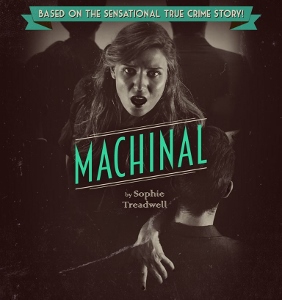MURDER—A REFUSAL TO SUBMIT?
You could call Machinal a nightmare under stage lights. Still potent after nearly ninety years, Sophie Treadwell’s 1928 drama can’t be dismissed as a victim’s vindication or as the proto-feminist defense of an angry housewife’s license to kill. It goes beyond blame-throwing and special pleas: Treadwell’s 90-minute indictment, here revived in a powerhouse staging by and at Greenhouse Theater Center, traces a crime to the punishment that precedes it as much as to the sentence that follows.
The curious dialogue lurches from deadening aphorisms and clichés to telegraph-terse cries for help. Alternating between factual details and poetic frenzy, 14 well-targeted scenes in one implacable one-act are loosely based on the 1928 trial of husband-killer Ruth Snyder (the first woman to die on the electric chair) which the playwright covered as a reporter for the New York Herald Tribune.
But the similarities are strained. Snyder and her accomplice Henry Judd Gray did the dirty deed for an insurance payout. Ironically, Helen (Heather Chrisler)’”listed generically like all the roles (“Young Woman”)’”has less free will than mercenary motives would grant her. As the title implies, she is a machine made by society to serve, in turn, as a stenographer, sweetheart, wife, and mother. Yet the same instruments of oppression also make her an adulteress, then murderess, then corpse.
Eleanor Kahn’s LED-lit setting bathes the second-floor stage in a bland fluorescence menaced by stage smoke. It’s the perfect neutral ground for hit-and-run depictions of Helen’s ever-exploitive world with its same-sex (but not same-age) seductions and a best friend urging her chum to get an abortion.
Trapped in commuter crawls, mocked by the six switchboard operators who form Treadwell’s sardonic chorus as “inefficient,” nagged by her pitiless mother (Carin Silkaitis) and cherished only as a breadwinner, Helen, playing roles but never feeling real, is then married to her boring boss Mr. Jones (Sean Gallagher). Disgusted by sex and her husband’s ugly small hands, Helen endures a lonely honeymoon in Atlantic City, then, unsure of how to be a mother (she never wants to nurse), enters a loveless six-year marriage.
But fate complicates this conformity. Helen meets equally banal Mr. Smith (Cody Proctor). This married Lothario perversely seduces this frustrated romantic with memories of murdering two men in Mexico with a bottle filled with small stones. Helen feels “purified” by his feckless indifference to respectability or any shared future ( ¿Quién sabe? is this drifter’s motto.) He gives her a flowering lily with a stone setting, a token of affection that becomes a future murder weapon.
But in one undramatized act Helen finally refuses to submit. Surrealistically specific, the elaborate trial scene depicts the 29-year-old as fated never “to be free,” betrayed by her lover’s testimony, then her own confession. Here Treadwell becomes a reporter again, brilliantly using earlier details’”like Helen’s habit of using gloves to avoid contact’”to prosecute the case against her.
Rightly or not, Helen pretends that eliminating her husband was her one fateful declaration of independence. At the frenetic, electrified end, an interrupted life is cut off in mid-sentence, as unfinished as unfulfilled. The dark conclusion: Helen is finally freed from the “sin of love.”
Of course, the real verdict is on society for making it so. But a triumphant acquittal goes to Jacob Harvey’s superbly stylized staging, an ensemble tour de force as brutally efficient as the title implies. The ten actors disappear into roles that are as socially set as they are shaped and scripted. Only Heather Chrisler’s anguished “young woman”’”the action portrait of a stereotype suddenly defining herself by self-destruction’”stands out.
Remarkably, everything on the Greenhouse stage is subordinated to the story, calculated to the last effect to drive Helen to one terrible choice. To argue that she had or that she lacked freedom to change her destiny is exactly what Treadwell’s protest play wants us to do. We accept Helen’s doom at our peril.
photos by Evan Hanover
Machinal
The Greenhouse Theater Center
presented with North Central College
Upstairs Main Stage, 2257 N. Lincoln Ave.
Thurs-Sat at 7:30; Sun at 2:30 (no performance August 17)
ends on September 24, 2017
for tickets, call 773.404.7336 or visit Greenhouse








